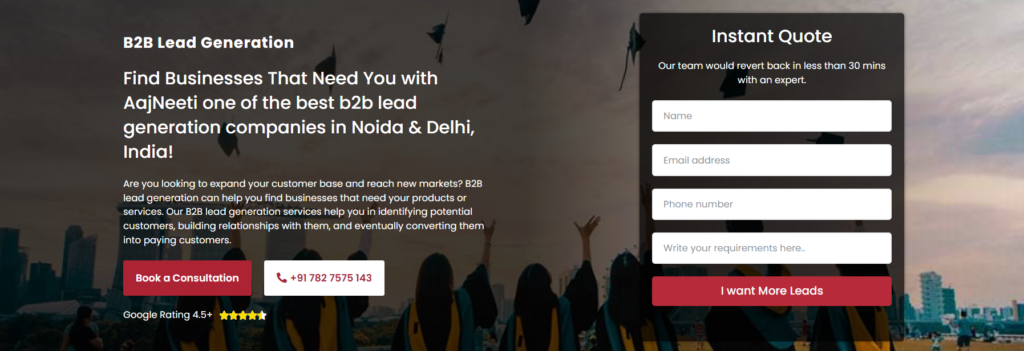
In today’s digital landscape, influencer marketing has become a powerful tool for B2B lead generation. While traditionally associated with B2C brands, this strategy can be effectively leveraged by B2B lead generation companies to enhance their outreach, credibility, and customer engagement. By partnering with influencers who have established trust within their niche, businesses can tap into new audiences and generate qualified leads. This article explores the role of influencer marketing in B2B lead generation, offering actionable strategies that companies can implement, particularly in sectors like real estate lead generation.
1. Understanding Influencer Marketing in the B2B Context
Influencer marketing involves collaborating with individuals who have a significant following and influence within a specific industry. In the B2B context, influencers are often thought leaders, industry experts, or respected professionals who can sway the opinions of their audience.
Why Influencer Marketing Matters in B2B:
- Trust and Credibility: Influencers have built trust with their followers. When they endorse a product or service, it carries more weight than traditional advertising.
- Targeted Reach: Influencers often cater to niche markets, allowing companies to reach specific audiences that are more likely to convert.
- Enhanced Engagement: Collaborating with influencers can lead to higher engagement rates, as their followers are typically more invested in their recommendations.
2. The Role of Influencer Marketing in B2B Lead Generation
For B2B lead generation companies, influencer marketing can play a vital role in various aspects of the lead generation process:
1. Building Brand Awareness
Influencers can help increase brand visibility by introducing your company to their followers. This exposure can create interest and familiarity, making potential clients more likely to engage with your brand.
2. Generating Qualified Leads
By promoting your products or services through trusted influencers, you can attract potential clients who are already interested in your industry. This targeted approach increases the likelihood of generating high-quality leads.
3. Nurturing Relationships
Influencer collaborations often involve ongoing partnerships, allowing businesses to build lasting relationships with both the influencer and their audience. This can lead to repeated engagements and referrals.
4. Providing Valuable Content
Influencers can create engaging content that showcases your products or services in action. This content can be shared across various platforms, offering potential clients valuable insights into your offerings.
3. Strategies for Effective Influencer Marketing in B2B
To successfully implement influencer marketing in B2B lead generation, companies should consider the following strategies:
1. Identify the Right Influencers
Choosing the right influencer is crucial. Look for individuals whose audience aligns with your target market. Consider the following criteria:
- Relevance: The influencer should have a strong presence in your industry.
- Engagement: Evaluate their engagement rates—higher interaction levels indicate a more invested audience.
- Authenticity: Select influencers who are genuine and have built a reputation for honesty and transparency.
2. Develop a Collaborative Campaign
Once you’ve identified suitable influencers, work collaboratively to develop a campaign that resonates with their audience. This could include:
- Webinars and Live Events: Host joint webinars where the influencer discusses relevant industry topics, featuring your products or services as solutions.
- Content Creation: Collaborate on blogs, videos, or podcasts that showcase your expertise and the influencer’s insights.
- Social Media Takeovers: Allow influencers to take over your social media accounts for a day to engage with your audience directly.
3. Create Valuable Content
Influencers can help create content that addresses the pain points and challenges faced by your target audience. This might include:
- Case Studies: Showcase how your solutions have helped other businesses succeed, presented by the influencer.
- Educational Resources: Develop ebooks or whitepapers that influencers can share with their audience, providing valuable insights while promoting your brand.
4. Leverage Social Proof
Utilize the influencer’s endorsement as social proof. Highlight testimonials, case studies, or success stories in your marketing materials to build trust with potential clients.
5. Track and Measure Results
To assess the effectiveness of your influencer marketing efforts, track relevant metrics such as:
- Engagement Rates: Monitor likes, shares, and comments on influencer posts.
- Lead Generation: Use unique tracking links to measure how many leads come directly from the influencer’s campaigns.
- Conversion Rates: Analyze the percentage of leads that ultimately convert into customers, allowing you to evaluate the ROI of your influencer partnerships.
4. Challenges and Considerations
While influencer marketing can be highly effective, it also comes with challenges that companies should be aware of:
1. Finding Genuine Influencers
In an increasingly crowded market, it can be challenging to find influencers who are authentic and have a genuine connection with their audience. Conduct thorough research and due diligence before partnering with anyone.
2. Managing Expectations
It’s essential to establish clear expectations from the outset. Define campaign goals, deliverables, and timelines to ensure both parties are aligned.
3. Compliance and Disclosure
Ensure that influencers comply with legal guidelines regarding endorsements. They should clearly disclose any partnerships to maintain transparency with their audience.
5. Influencer Marketing in Real Estate Lead Generation
For companies involved in real estate lead generation, influencer marketing offers unique opportunities:
1. Partnering with Real Estate Experts
Collaborate with established real estate agents, investors, or industry analysts who have a substantial following. Their endorsement can help establish your credibility in the market.
2. Showcasing Properties
Influencers can showcase your listings through virtual tours or live walkthroughs, giving potential buyers an engaging view of available properties.
3. Hosting Educational Events
Influencers can host webinars or workshops focused on real estate topics, providing valuable insights while promoting your services.
4. Creating Community Engagement
Real estate is often about community. Influencers can help foster a sense of community around your brand by engaging with local audiences and promoting local events.
6. Conclusion: The Future of Influencer Marketing in B2B Lead Generation
As the landscape of B2B marketing continues to evolve, influencer marketing is proving to be a valuable strategy for B2B lead generation companies. By identifying the right influencers, developing collaborative campaigns, and leveraging the authenticity of these partnerships, businesses can effectively reach new audiences and generate qualified leads.
For companies looking to enhance their lead generation strategies, partnering with Aajneeti Advertising can provide the expertise needed to navigate the complexities of influencer marketing. With a focus on authenticity and value, Aajneeti Advertising helps businesses create meaningful connections that drive engagement and conversions. By harnessing the power of influencer marketing, companies can unlock new opportunities for growth and success in their lead-generation efforts.
Also, Read this Common Mistakes to Avoid When Creating a Wikipedia Page




